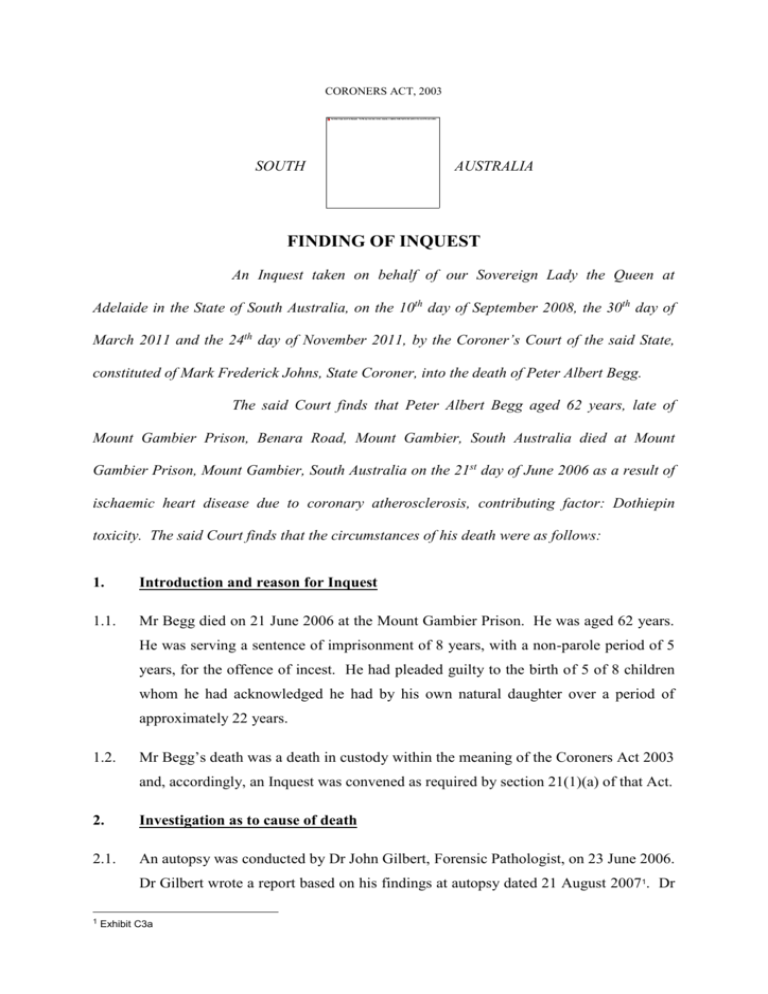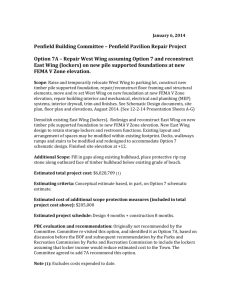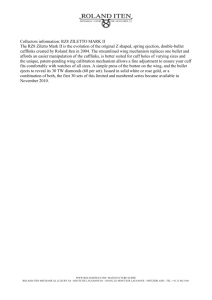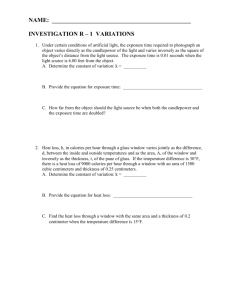BEGG Peter Albert - Courts Administration Authority
advertisement

CORONERS ACT, 2003 SOUTH AUSTRALIA FINDING OF INQUEST An Inquest taken on behalf of our Sovereign Lady the Queen at Adelaide in the State of South Australia, on the 10th day of September 2008, the 30th day of March 2011 and the 24th day of November 2011, by the Coroner’s Court of the said State, constituted of Mark Frederick Johns, State Coroner, into the death of Peter Albert Begg. The said Court finds that Peter Albert Begg aged 62 years, late of Mount Gambier Prison, Benara Road, Mount Gambier, South Australia died at Mount Gambier Prison, Mount Gambier, South Australia on the 21st day of June 2006 as a result of ischaemic heart disease due to coronary atherosclerosis, contributing factor: Dothiepin toxicity. The said Court finds that the circumstances of his death were as follows: 1. Introduction and reason for Inquest 1.1. Mr Begg died on 21 June 2006 at the Mount Gambier Prison. He was aged 62 years. He was serving a sentence of imprisonment of 8 years, with a non-parole period of 5 years, for the offence of incest. He had pleaded guilty to the birth of 5 of 8 children whom he had acknowledged he had by his own natural daughter over a period of approximately 22 years. 1.2. Mr Begg’s death was a death in custody within the meaning of the Coroners Act 2003 and, accordingly, an Inquest was convened as required by section 21(1)(a) of that Act. 2. Investigation as to cause of death 2.1. An autopsy was conducted by Dr John Gilbert, Forensic Pathologist, on 23 June 2006. Dr Gilbert wrote a report based on his findings at autopsy dated 21 August 20071. Dr 1 Exhibit C3a 2 Gilbert attributed death to ischaemic heart disease due to severe coronary atherosclerosis in that report. Dr Gilbert made the following comments: '1. The deceased was a prisoner in Mount Gambier Prison. He had a history of chronic obstructive pulmonary disease associated with heavy smoking, a CV A in 2002, gastro-oesophageal reflux disease and hiatus hernia. On the 24th of May 2006, the deceased reported chest pain and shortness of breath on exertion. The prison medical officer considered that he may have had stable angina and suggested that the deceased try using Nitrolingual spray when he next experienced chest pain. Witnesses described the deceased becoming short of breath while pushing a food trolley at the prison on 21 June 2006. He was then seen to collapse and undergo respiratory arrest associated with generalised cyanosis. He was attended by a prison medical officer and later by ambulance officers. He was initially in sinus rhythm and then developed sinus bradycardia followed by cardiac arrest. He did not respond to resuscitation attempts. 2. At autopsy, there was severe narrowing of the left anterior descending and right coronary arteries due to coronary atherosclerosis. An area of myocardial scarring was noted in the posteroseptal aspect of the left ventricle consistent with previous myocardial infarction. Death was attributed to ischaemic heart disease due to severe coronary atherosclerosis. Other findings included marked pulmonary emphysema attributable to heavy smoking, mild nephrosclerosis of the kidneys, a small left adrenal cortical adenoma, a small lacune in the right putamen of the brain and rib fractures and fat emboli attributable to cardiopulmonary resuscitation. 2.2. 3. Analysis of a specimen of blood obtained at autopsy reportedly showed a blood alcohol concentration of nil. The blood contained a greater than therapeutic levels of the antidepressant dothiepin (2 mg/L) and the antiemetic metoc1opramide. The increased levels were likely to be due to post mortem redistribution. The blood also contained a low therapeutic level of chlorpromazine (antipsychotic, major tranquilliser). 4. There were no findings to indicate other than natural causes for the death. 5. There were no injuries or other markings on the body to indicate the involvement of another person in the death.' 2 In a further report dated 15 May 2008, Dr Gilbert supplemented his earlier report as follows: 'At the time of completing the original autopsy report dated 21 August 2007, I noted an abnormally high level of dothiepin in the blood (2 mg/L). I remarked on the high dothiepin level but believed it to be most likely due to post mortem redistribution. 2 Exhibit C3a, page 6 3 Dothiepin, a tricyclic antidepressant, is particularly susceptible to post mortem redistribution.' 3 Dr Gilbert then repeated some of the history immediately preceding Mr Begg’s death and his findings of significant atherosclerotic narrowing of the coronary arteries and old ischaemic scarring of the posteroseptal region of the left ventricle. He went on to say: 'Based on the clinical history, the description of his collapse and the autopsy findings, I believed at the time that the death had resulted from ischaemic heart disease due to coronary atherosclerosis. As a precaution, on 21 August 2007, I requested that our toxicologists revisit the case and check the level of dothiepin in the post mortem sample of liver tissue. A therapeutic level in the liver would have confirmed that the high blood level had simply been due to post mortem redistribution. On 13 May 2008 I learned that a potentially lethal level of dothiepin (approximately 39 mg/kg) had been identified in the liver. Post mortem redistribution therefore appears to have been excluded as the likely cause for the high blood level. On this basis it is necessary to revise the cause of death to the following: CAUSE of DEATH: Dothiepin toxicity atherosclerosis.' 4 complicating ischaemic heart disease due to coronary Dr Gilbert then added by way of explanation: 'Ischaemic heart disease would predispose to the development of cardiac arrhythmias in the presence of dothiepin toxicity. Hypotension resulting from dothiepin toxicity would likely exacerbate pre-existing ischaemic heart disease.' 5 He commented: 'Central nervous system symptoms of dothiepin toxicity may include agitation, delirium, hyperpyrexia, convulsions, ataxia, respiratory depression, coma, unconsciousness, muscle twitching, hyperreflexia, hypothermia, visual hallucinations and respiratory or metabolic alkalosis. Cardiovascular symptoms include cyanosis, shock, hypotension, sinus tachycardia and cardiac arrhythmias. The latter are the usual cause of death. The deceased had been prescribed 200 milligrams of dothiepin to be taken nightly. 200 milligrams is at the upper limit of the recommended adult daily dosage range. Toxic blood levels may accumulate in individuals with hepatic or renal impairment. The manufacturers' prescribing information warns of this problem. In the present case, there 3 Exhibit C3b, page 1 Exhibit C3b, page 1 5 Exhibit C3b, page 1 4 4 was no histological evidence of significant liver disease but the kidneys showed mild diffuse cortical atrophy macroscopically and moderate benign nephrosclerotic changes were noted histologically. It is possible that the deceased's high blood and liver levels arose due to prescription of a relatively high dose of dothiepin in the presence of a degree of renal impairment.' 6 Dr Gilbert went on to say that if there is no biochemical evidence of either hepatic or renal impairment, the possibility of overdosage should be considered. 3. Emeritus Professor Lindon Wing 3.1. Following receipt of this supplementary report from Dr Gilbert, the case was referred for a further opinion from Emeritus Professor Lindon Wing of the Department of Clinical Pharmacology, School of Medicine, Flinders University. Professor Wing produced an extremely detailed report dated 20 October 20087 in which he made the following findings: 'Overall the impression I have gained from reading the documentation provided is that Mr Begg was provided with a reasonable level of care throughout the whole period of his incarceration … Overall the level of medical care would at least match the average provided in general practice in the community. To some extent deficiencies in his care compared to the norm in the community may have related to his own adversarial attitudes to medical care, especially in the early part of1lis incarceration. There are many instances when it has been stated that Mr Begg was unwilling to be referred to specialist doctors for a further opinion or to have the necessary special investigations required to gain a better understanding of his medical condition. However whenever there was concern as to whether he might harm himself, appropriate concern was expressed and documented and action taken so that he was provided with an appropriate higher level of observation.' 8 3.2. Professor Wing noted that Mr Begg had been diagnosed by Dr Raeburn in 2003 as having a major depressive disorder and that he had an antisocial personality disorder and intellectual impairment. Professor Wing found that the prescription of dothiepin for the diagnosis of depression was appropriate. Furthermore it was appropriately titrated until it was being prescribed at the highest recommended dose. 3.3. Professor Wing noted that there was nothing in Mr Begg’s medical record, or the observations made by correctional officers, to suggest that there was any change in his psychiatric state or any acute deterioration in the period leading up to the collapse. In 6 Exhibit C3b, page 2 Exhibit C29 8 Exhibit C29, pages 1-2 7 5 particular, Professor Wing noted that there was nothing to suggest that Mr Begg may have contemplated taking an overdose of dothiepin at that time. 3.4. Professor Wing noted that the dothiepin was prescribed in Webster packs. He expressed the opinion that if they were provided to Mr Begg daily by the prison nurse, there was very little likelihood of him stockpiling the medication and therefore his compliance could be assumed to be excellent. The evidence showed that that was indeed the way in which Mr Begg’s medication was delivered to him. In fact it was provided to him four times per day, morning and night by the prison nurse and twice during the day by correctional officers. It seems unlikely therefore that there would have been an opportunity for Mr Begg to stockpile his dothiepin in order to accumulate enough for an overdose. 3.5. Professor Wing stated that in his opinion, the diagnosis of depression, and its treatment in Mr Begg’s case, met all reasonable standards and that he was reviewed by psychiatrists at appropriate intervals. 3.6. Professor Wing was mildly concerned about the complaints Mr Begg had made of having suffered from blackouts regularly throughout his time in prison. Professor Wing said that it was possible that the ‘blackouts’ could have been an undiagnosed manifestation of Mr Begg’s coronary artery disease and a precursor to his fatal collapse. He said that the blackouts were never properly explained and there was suggestive evidence that they could have originated from an undiagnosed disturbance of cardiac rhythm secondary to coronary artery disease. He said that it would have been more appropriate for Mr Begg to have undergone appropriate investigations including transthoracic echo, carotid dopplers, holter monitor and an exercise stress test. It appears that the echocardiogram and carotid doppler examinations were performed but not the other tests. Neither of the tests performed showed any abnormality and Mr Begg, in July 2005, reported to a specialist that his symptoms had settled. Professor Wing remained concerned that there was no satisfactory explanation of Mr Begg’s ‘blackouts’ which had been occurring over a period of at least four years. 6 3.7. Professor Wing expressed the opinion that Mr Begg’s medical care was at the average standard provided in Australian general practice and added that Mr Begg’s ‘care was undoubtedly patient-centred and compassionate’9. However, Professor Wing noted: 'The area in which his care has been less than optimal relates to the degree of diagnostic accuracy applied to the various physical problems and their resulting relatively superficial level of treatment. In particular the management of his ‘blackouts’ and chest pain was suboptimal. Better identification of the potential seriousness of these problems resulting in their better management could have prevented his final fatal ‘collapse’.' 10 3.8. It was Professor Wing’s opinion that it was unlikely that the fatal collapse suffered by Mr Begg was made any more likely by his background daily treatment with high dose dothiepin. Professor Wing said that the event was typical of those which can occur suddenly and at random in people with underlying severe coronary artery disease. 3.9. Professor Wing stated: 'Dothiepin toxicity is usually associated with marked disturbances of conscious state (Ilett et al Therapeutic Drug Monitoring 1991; 13: 485-489), but no such description was made in relation to Mr Begg on the morning he collapsed. In fact he was described by one of the other prisoners who lived in the same cottage as being as ‘good as gold’ that morning and being in ‘very good spirits’. In my opinion these observations of his clinical state and those recorded of his subsequent interactions while collecting the weekly food stores for his cottage are not compatible with him suffering at that time from dothiepin toxicity. As mentioned already, a ‘collapse’ event such as the one suffered by Mr Begg is a not uncommon clinical feature of underlying severe coronary artery disease and no other additional influence needs to be involved to explain it.' 11 3.10. Professor Wing remarked upon the high post-mortem concentration of dothiepin found in Mr Begg’s blood and liver. He went so far as to suggest, based on his observations that the high values were not matched by any aspect of Mr Begg’s clinical state, that there may have been some question about the validity of the toxicological testing that had been carried out. Professor Wing stated: 'My conclusion is that I am highly sceptical that dothiepin toxicity was the cause of Mr Begg's death.' 12 3.11. Following receipt of Professor Wing’s very helpful report, comment was sought from Mr Chris Kostakis, Senior Forensic Scientist, who had provided the original 9 Exhibit C29, page 11 Exhibit C29, page 11 11 Exhibit C29, page 14 12 Exhibit C29, page 15 10 7 toxicology reports13. Mr Kostakis provided his assurance that the toxicology testing had been conducted according to established techniques, internationally recognised and accepted within the forensic toxicology community and also in the wider and Analytical Chemistry profession as ‘gold standard’ techniques14. He noted that the laboratory is accredited by NATA, an international testing authority and that on his review of the casenotes there were no indications of any errors relating to the reported levels of dothiepin in the blood or liver in this case. 4. Conclusion as to cause of death 4.1. The report of Emeritus Professor Wing, together with the comments provided by Mr Kostakis, were referred back to Dr Gilbert for his comments and, in an email dated 8 February 2011 to counsel assisting, Dr Gilbert noted that there were demonstrably excessive levels of dothiepin present in the liver. Dr Gilbert offered the following as the cause of death in the case of Mr Begg - 'Cause of death: Ischaemic heart disease due to coronary atherosclerosis. Contributing factor: Dothiepin toxicity', and I so find. 5. Conclusions 5.1. In my opinion, it is safe to rule out the possibility that Mr Begg took an overdose of dothiepin given the observations that were made of him on the day of his death. Furthermore, although Mr Begg was being provided with dothiepin at the highest recommended dose, the doses were within medically accepted limits. It may be that due to renal impairment Mr Begg was unable to adequately metabolise the prescribed doses. Nevertheless, I make no criticism of his treatment which, as stated by Professor Wing, in this respect, was appropriate. Clearly the dothiepin medication was an appropriate response to Mr Begg’s depression and may have prevented him from harming himself. Clearly it improved the quality of his life while in prison. 5.2. I am however concerned about the reservations expressed by Professor Wing about the suboptimal responses to Mr Begg’s cardiac symptoms. I do not propose to make any recommendations, however I do draw the concerns expressed by Professor Wing to the attention of the Department for Correctional Services and the Prison Health Service, with the suggestion that they be carefully considered and that both of those 13 14 Exhibit C4b Exhibit C3c, page 3 8 agencies satisfy themselves that prisoners with cardiac symptoms are being appropriately managed in the State’s prison system. 6. Recommendations 6.1. I have no recommendations to make in this matter. Key Words: Death in Custody; Dothiepin Toxicity In witness whereof the said Coroner has hereunto set and subscribed his hand and Seal the 24th day of November, 2011. State Coroner Inquest Number 28/2008 (0880/2006)








